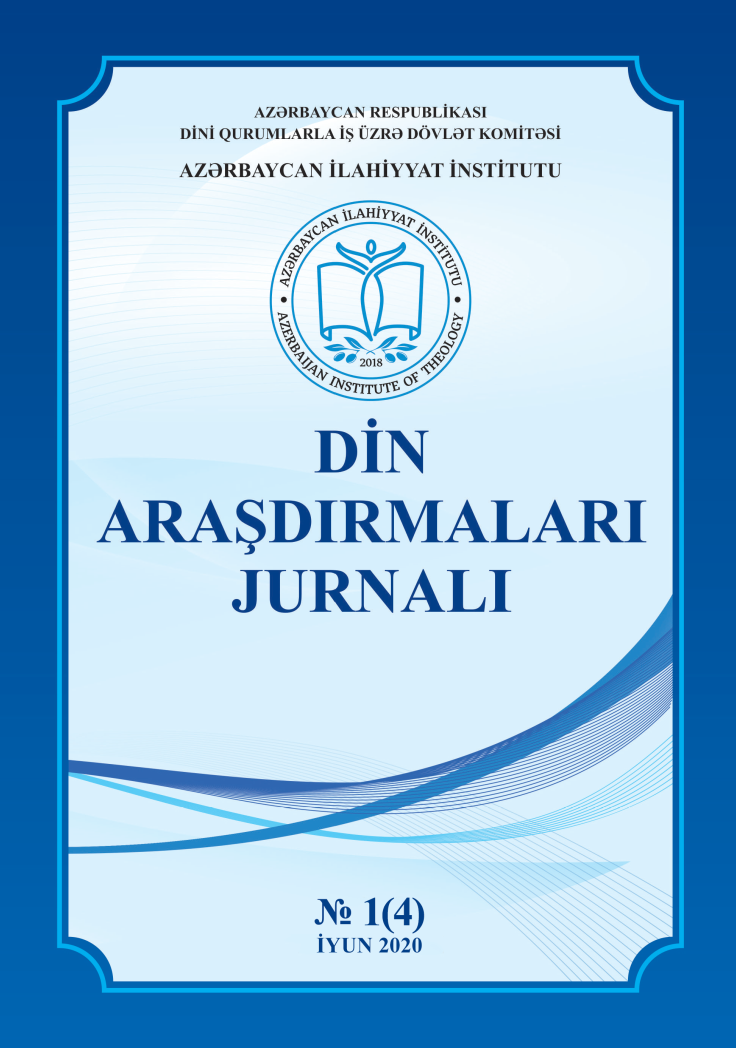Psixoloji aspekt: gənclərdə dini münasibət və xoşbəxtlik əlaqəsi
Psychological Aspect: Relations Between Religious Attitude and Happiness in Youth Group
Связь отношения молодежи к религии и счастью: психологический аспект
Abadi Totok Wahyu, Ilmi Usrotin Choiriyah, Hendra Sukmana and Mohamad Hatta Karuniawan. (2018). Factors Affecting of Lifes Happiness, Revitalization of Local Wisdom in Global and Competitive Era, (ss. 41-45).
Abdel-khalek Ahmed M. (2010). Quality of Life, Subjective Well-Being, And Religiosity in Muslim College Students, Qual Life Research, 19, (ss. 1133–1143).
Alesina Alberto, Rafael Di Tella and Robert MacCulloch. (2004). Inequality and happiness: Are Europeans and Americans different? Journal of Public Economics, 88, 2009–2042.
Anusıc Ivana, Stevie C. Y.Yap, & Richard E. Lucas. (2014). Does personality moderate reaction and adaptation to major life events? Analysis of life satisfaction and affect in an Australian national sample. Journal of Research in Personality, 51, (ss. 69–77).
Azərbaycan Gəncləri -2018, Azərbaycan Respublikasının Dövlət Statisti- ka Komitəsi, Statistik Məcmuə, (s.123).
Beyers Jaco. (2014). The effect of religion on poverty, HTS Teologiese Studies/ Theological Studies 70(1), http://dx.doi.org/10.4102/hts.v70i1.2614 (20.10.2019) (ss. 1-8).
Boyce C.J., Brown G.D.A., & Moore S.C. (2010). Money and Happiness: Rank of İncome, not Income, Affects Life Satisfaction. Psychological Science, 21(4), (471–475).
Chan Grace, Paul Miller and MoonJoong Tcha. (2005). Happiness in Univer- sity Education, International Review of Economics Education, 4/1, (ss. 20–45).
Conger, Katherine Jewsbury, Martha A. Rueter, Rand D. Conger. (2000). The role of economic pressure in the lives of parents and their adolescents: The family stress model. In: L. J. Crockett and R. K. Silbereisen (Eds.), Negotiating adolescence in times of social change, New York: Cambridge University Press, (ss. 201-233).
Dıener, Ed, (2000). Subjective well-being: The science of happiness and a proposal for a national index. American Psychologist, 55, (ss. 34–43).
Francıs Leslie J., Hans-Georg Ziebertz and Christopher Alan Lewis. (2003). “The Relationship Between Religion an Happiness Among German Students”, Pastoral Psychology, vol. 51, No. 4, (ss, 273-281).
Howell Ryan T., & Howell C.J. (2008). The Relation of Economic Status to Subjective Well-Being in Developing countries: A meta-analysis. Psychological Bulletin, 134(4), (ss. 536–560).
Inglehart Ronald, Roberto Foa, Christopher Peterson and Christian Welzel. (2008). Development, freedom and rosing happiness. A global perspective (1981-2007). Perspectiveson Psychological Science, 3, (ss. 264- 285).
Inglehart Ronald. and R. Rabier: 1986, "Aspirations adapt to situations- but why are the Belgians so much happier than the French? A crosscultural analysis of the subjective quality of life", Research on the Quality of Life, ed. by F.M. Andrews (Institute for Social Research, University of Michigan, Ann Arbor) (pp. I-56).
Kağıtçıbaşı Çiğdem ve Zeynep Cemalcılar. (2016). Dünden Bu Güne İnsan ve İnsanlar Sosyal Psikolojiye Giriş, İstanbul.
Kaya Mevlüt. (1998). Din Eğitiminde İletişim ve Dini Tutum, Samsun: Etüt Yayınları.
Kerimov Eldar.(2016). Üniversite Öğrencilerinin İnternet Bağımlılığı Dü- zeyleri ile Din Algıları Üzerine Bir Araştırma, (Yayınlanmamış Yüksek Lisans Tezi), Ondokuz Mayıs Üniversitesi, Sosyal Bilimleri Enstitüsü, Samsun.
Lyubomırsky Sonja, Kennon M. Sheldon, & David Schkade. (2012). Pursuing happiness: The architecture of sustainable change, Review of General Psychology, 9(2), (ss. 111–131).
Lyubomirsky Sonja, Heidi Lepper. (2005). A measure of subjective hapiness: Preliminary realiability and construct validation. Social indicators Research, 46, 1999, (ss. 137-155).
Mcnıel Murray J., & William Fleeson. (2006).The causal effects of extraversion on positive affect and neuroticism on negative affect: Manipulating state extraversion and state neuroticism in an experimental approach, Journal of Research in Personality, 40, (ss. 529–550).
Michalos Alex C. (1991). Global Report on Student Well-Being, Volume I: Life Satisfaction and Happiness, New York: Library of Congress Cataloging-in-Publication Data, (s.111).
Miret M., Caballero F.F., Chatterji, S., Olaya B., Tobiasz-Adamczyk B., Koskinen, S., et al. (2014). (Health and Happiness: Cross-sectional Household Surveys in Finland, Poland and Spain, Bulletin of the World Health Organization, 92, (716–725).
NG Weiting, Ed Diener. (2014). What Matters to The Rich and The Poor? Subjective Well-being, Financial Satisfaction, and Postmaterialist Needs Across the World, Journal of Personality and Social Psychology, 107(2), (ss. 326–338).
Ngamaba Kayonda Hubert and Debbie Soni. (2017). Are Happiness and Life Satisfaction Different Across Religious Groups? Exploring Determinants of Happiness and Life Satisfaction, Springer, Journal of Religion and Health, Online Publishing, 1-22.
Norris Pippa & Ronald Inglehart. (2011). Sacred and secular: Religion and politics worldwide, 2nd edn., Cambridge: Cambridge University Press, http://dx.doi.org/10.1017/CBO9780511894862 (18.10.2019).
Okun M.A., W.A.Stock, M.J. Haring and R.A.Witter. (1984). "Health and subjective well-being: a meta-analysis", International Aging and Human Development, 19, (pp.ll1-132).
Olupona Jacob K. (2009). ‘Understanding poverty and its alleviation in Africa and the African diaspora: An interdisciplinary approach’, in P.J. Paris (ed.), Religion and Poverty: Pan-African Perspectives, Duke University Press, Durham (p- xvi), (ss. ix–xxiii).
Özbaydar Belma. (1970). Din ve Tanrı İnancının Gelişmesi Üzerine Bir Araştırma, İstanbul: Baha Matbaası.
Peker Hüseyin. (2013). Din Psikolojisi, İstanbul: Çamlıca Yayınları. Prasetyo Anggun Resdasari. (2015). An Overview of Career Happiness.
Plan on Lecturers. Journal of Psychology Undip, 14 (2), (ss. 174-182).
Prieto Chu Kim, Ed Diener, Tamir M., Scollon C., & Diener, M. (2005). Integrating the diverse definitions of happiness: A time sequential framework of subjective well-being, Journal of Happiness Studies, 6, (ss. 261–300).
Roberts Brent W., Kate E. Walton, & Wolfgang Viechtbauer. (2006). Patterns of mean-level change in personality traits across the life course: A meta-analysis of longitudinal studies, Psychological Bulletin, 132, (ss. 1–25).
Seligman, Martin. (2004). Authentic Happiness, Using the New Positive Psychology to Realize Your Potential for Lating Fulfillment, New York: Free Press.
Vera Pablo, Karem Celis, Paula Pavez and others. (2012). Money, Age and Happiness: Association of Subjective Wellbeing with Socio-Demographic Variables, Revista Latinoamericana de Psicología, 44, (ss. 155-163).
Yanmış Mehmet ve Bayram Kahraman. (2013). “Gençlerin Dini ve Etnik Kimlik Algısı: Diyarbakır Örneği”, Akademik İncelemeler Dergisi, 8/2.
Downloads
Article Information
- Article Type Psychology of Religion
- Submitted April 1, 2020
- Published June 30, 2020
- Issue № 1(4) June 2020
- Section Psychology of Religion
